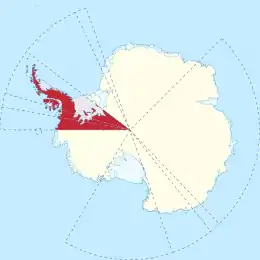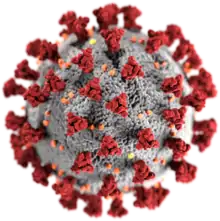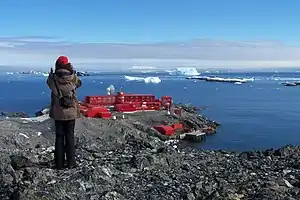COVID-19 pandemic in Antarctica
The COVID-19 pandemic in Antarctica is part of the worldwide pandemic of coronavirus disease 2019 (COVID-19) caused by severe acute respiratory syndrome coronavirus 2 (SARS-CoV-2). Due to its remoteness and sparse population, Antarctica was the last continent to have confirmed cases of COVID-19 and was one of the last regions of the world affected directly by the pandemic.[1][2][3] The first cases were reported in December 2020, almost a year after the first cases of COVID-19 were detected in China. At least 36 people are confirmed to have been infected.[4] Even before the first cases on the continent were reported, human activity in Antarctica was indirectly impacted.
| COVID-19 pandemic in Antarctica | |
|---|---|
 As of 31 December 2020 | |
| Disease | COVID-19 |
| Virus strain | SARS-CoV-2 |
| Location | Antarctica |
| First outbreak | Wuhan, Hubei, China |
| Index case | Base General Bernardo O'Higgins, Chilean Antarctic Territory |
| Arrival date | 21 December 2020 (1 month, 2 weeks and 4 days ago) |
| Confirmed cases | 58 |
| Active cases | 58 |
Territories | |
| Part of a series on the |
| COVID-19 pandemic |
|---|
 |
|
|
|
Background

On 12 January 2020, the World Health Organization (WHO) confirmed that a novel coronavirus was the cause of a respiratory illness in a cluster of people in Wuhan, Hubei, China, which was reported to the WHO on 31 December 2019.[5][6]
The case fatality ratio for COVID-19 has been much lower than SARS of 2003,[7][8] but the transmission has been significantly greater, with a significant total death toll.[9][7]
Impact on scientific research
People coming to Antarctica research stations have to undergo isolation and COVID-19 screening.[1] The Antarctica research stations of Australia, Norway and Germany have respirators and coronavirus tests; it remains unconfirmed whether the research stations of the U.S. and Britain have them.[1] The British Antarctic Survey implemented precautionary measures.[10]
The impact of the COVID-19 pandemic on travel caused complications with evacuating British Antarctic Survey personnel from the continent.[11]
As of 14 April 2020, bases in Antarctica contain only skeleton crews, visitors have been limited, and scientific research has been impacted.[12] Several conferences on the topic of Antarctica that had been planned for mid-2020 were cancelled due to the pandemic.[13]
Cases
In April 2020, a cruise ship headed for Antarctica had almost sixty percent of its passengers test positive for COVID-19. The cruise stopped in Uruguay, where the passengers were allowed to disembark.[14][15][16]
The first official cases were announced on 21 December 2020 by the government of Chile. At least 36 people, including 10 civilians and 26 officers of the Chilean Army and Chilean Navy, were confirmed as positive for COVID-19 after contracting the virus on the Base General Bernardo O'Higgins Riquelme (in continental Antarctica), where they were doing scheduled maintenance work for the base. The people developed symptoms for COVID-19 aboard the Sargento Aldea ship, and most of the cases were treated after arriving to their destinations in Punta Arenas and Talcahuano.[4][17][18][19]
References
- Taylor, Adam; Pitrelli, Stefano (24 March 2020). "One continent remains untouched by the coronavirus: Antarctica". Washington Post. Archived from the original on 1 April 2020. Retrieved 3 April 2020.
- Torres, Elle (20 March 2020). "What life is like on Antarctica, the only continent without a case of coronavirus". ABC News. Archived from the original on 1 April 2020. Retrieved 3 April 2020.
- Agence France-Presse (31 March 2020). "Pacific islands, Antarctic bases: coronavirus-free living in some of Earth's most isolated places". South China Morning Post. Archived from the original on 3 April 2020. Retrieved 3 April 2020.
- "Reportan brote de coronavirus en base chilena en la Antártida". infobae (in Spanish). 21 December 2020. Archived from the original on 23 December 2020. Retrieved 21 December 2020.
- Elsevier. "Novel Coronavirus Information Center". Elsevier Connect. Archived from the original on 30 January 2020. Retrieved 15 March 2020.
- Reynolds, Matt (4 March 2020). "What is coronavirus and how close is it to becoming a pandemic?". Wired UK. ISSN 1357-0978. Archived from the original on 5 March 2020. Retrieved 5 March 2020.
- "Crunching the numbers for coronavirus". Imperial News. Archived from the original on 19 March 2020. Retrieved 15 March 2020.
- "High consequence infectious diseases (HCID); Guidance and information about high consequence infectious diseases and their management in England". GOV.UK. Archived from the original on 3 March 2020. Retrieved 17 March 2020.
- "World Federation Of Societies of Anaesthesiologists – Coronavirus". www.wfsahq.org. Archived from the original on 12 March 2020. Retrieved 15 March 2020.
- "British Antarctic Survey response to COVID-19". British Antarctic Survey. 24 March 2020. Archived from the original on 2 April 2020. Retrieved 3 April 2020.
- Amos, Jonathan (7 April 2020). "Coronavirus complicates journeys home from Antarctica". BBC News. Archived from the original on 8 April 2020. Retrieved 20 April 2020.
- Laing, Aislinn; Garrison, Cassandra (14 April 2020). "'Isolated within isolation': keeping out coronavirus in the frozen Antarctic". Reuters. Archived from the original on 20 April 2020. Retrieved 20 April 2020.
- "International Antarctic conferences cancelled due to coronavirus". Australian Antarctic Division. 19 March 2020. Archived from the original on 23 March 2020. Retrieved 3 April 2020.
- https://www.sbs.com.au/news/greg-mortimer-uruguay-evacuates-australians-and-new-zealanders-on-coronavirus-infected-ship
- Griffiths, James; Castillo, Jackie (8 April 2020). "Passengers to be evacuated from Antarctic cruise ship after almost 60% test positive for coronavirus". CNN. Archived from the original on 17 April 2020. Retrieved 20 April 2020.
- Al-Arshani, Sarah (9 April 2020). "Nearly 60% of the passengers on an Antarctic cruise ship have tested positive for the coronavirus". Business Insider. Archived from the original on 18 April 2020. Retrieved 20 April 2020.
- "Antártida: 36 relevados de base chilena por COVID-19". ExpressNews.com. Associated Press. 21 December 2020. Archived from the original on 22 December 2020. Retrieved 21 December 2020.
- Díaz Montero, Felipe (17 December 2020). "Posible brote COVID enciende alarmas de base chilena en Antártica tras visita de buque de la Armada". Bío Bío Chile. Archived from the original on 17 December 2020. Retrieved 21 December 2020.
- "El coronavirus llegó a la Antártida; base militar chilena registra 58 casos". El Financiero (in Spanish). Archived from the original on 23 December 2020. Retrieved 23 December 2020.
External links
| Wikimedia Commons has media related to COVID-19 pandemic in Antarctica. |

.svg.png.webp)